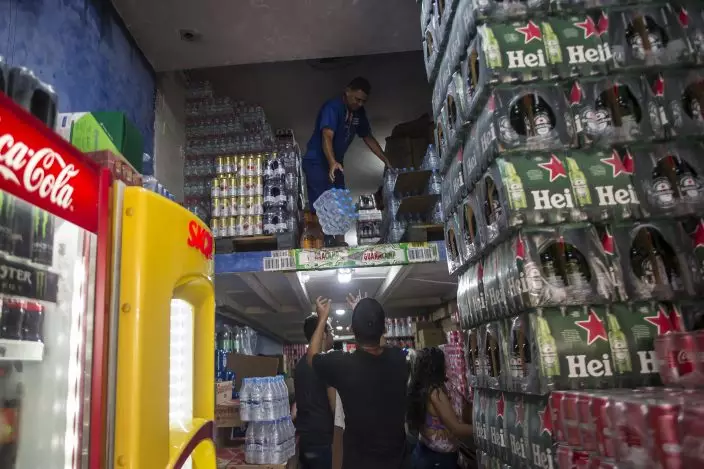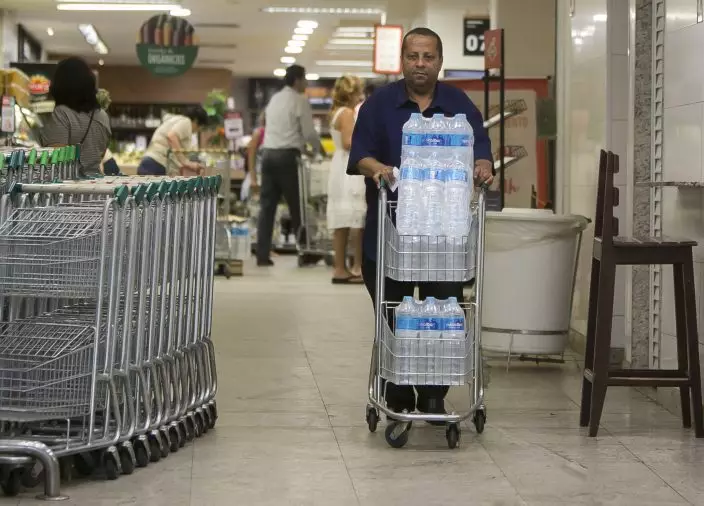There’s a creeping sense of alarm in Rio de Janeiro after more than a week of foul tasting and smelling tap water in dozens of neighborhoods. Rumors are flying, and residents are hoarding bottled water.
People in the metropolitan area have taken to social media to show glasses of water that appears reddish or brownish. Several supermarkets visited by the Associated Press on Wednesday had run out of bottled water.
There have been rumors — denied by officials — that the state water utility, Cedae, would cut off supply of water to millions of residents, or that tests by have determined the water unfit for consumption.

Workers toss down bottled water to be distributed in supermarkets in Rio de Janeiro, Brazil, Wednesday, Jan. 15, 2020. There’s a creeping sense of alarm in Rio de Janeiro after more than a week of foul tasting and smelling tap water in dozens of neighborhoods, and residents are hoarding bottled water. (AP PhotoBruna Prado)
Mariana Bretas, 29, received a viral text message saying people must plug their ears with cotton when showering.
“I don’t know if it’s true, but we’re getting scared,” Bretas said after buying five liters of water.
Cedae has said the peculiar water is due to geosmin, an organic compound that is innocuous, and that the water meets health ministry requirements. Even so, it said it will begin using powdered activated carbon at the start of treatment to curb geosmin.

Almir Vicente pushes his recently bought bottled water at a supermarket in the Copacabana neighborhood of Rio de Janeiro, Brazil, Wednesday, Jan. 15, 2020. There’s a creeping sense of alarm in Rio de Janeiro after more than a week of foul tasting and smelling tap water in dozens of neighborhoods, and residents are hoarding bottled water. (AP PhotoBruna Prado)
Local paper O Globo has reported a spike in cases of diarrhea, gastroenteritis and vomiting in Rio's west zone, and quoted the state health secretariat as saying it’s too early to associate higher incidence of symptoms with contaminated water, particularly during the holiday season. The health secretariat didn't immediately respond to AP's request for information.
Rio Gov. Wilson Witzel’s patience has worn thin; On Tuesday night he called for analysis of the water's quality as well as of the utility's management.
“The disorder the population has been suffering due to the problem with water provided by Cedae is inadmissible,” Witzel said on Twitter. “The company (Cedae) must accelerate its ultimate solution to improve water quality and sewage treatment in cities near the springs. The consumer cannot be harmed.”
O Globo reported on Tuesday that, following Witzel's announcement, the utility fired the head of the water treatment station that provides water to Rio’s Baixada Fluminense area, and is one of the largest in the world.
The facility receives water from the Paraiba do Sul River, but also several sewage-contaminated streams, which Cedae does an insufficient job of treating, said Joao Paulo Machado Torres, a professor of environmental biophysics at Rio's federal university who has previously studied the city water system.
“Service is so bad that the situation is unhealthy,” Torres said.
Cedae did not reply to AP requests for information, but said it would hold a news conference later.
At one market in Rio that still had supply of water, Natalia Villas Boas, a 65-year-old dentist, filled her shopping cart with 38 liters of bottles.
“People are saying the water is contaminated and it has a very weird smell,” said Villas Boas. “I don’t want to risk getting any infection.”


